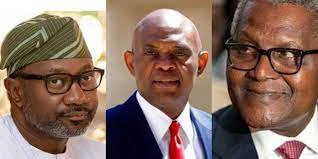With about 8,200 high-net-worth individuals, Nigeria ranks as Africa’s third-largest hub of wealthy people, trailing only Egypt and South Africa, according to Henley & Partners. Many Nigerians have achieved this great success and prosperity and have significantly contributed to the growth and development of their country. ...Tap To Read The Full Story Here | ..Tap To Read The Full Story Here...
Among these affluent Nigerians is Aliko Dangote, Africa’s wealthiest man, whose fortune has recently reached an all-time high of $28 billion, primarily due to the completion of his much-anticipated oil refinery in Nigeria.
Dangote’s journey to wealth has been marked by ambitious projects and strategic investments, like his interest in acquiring Arsenal Football Club, though the club’s current $4 billion valuation now poses a challenge. Beyond personal milestones, Dangote’s ventures, such as his refinery, have transformed Nigeria’s economic landscape, creating jobs and infrastructure without relying on government incentives.
Similarly, other prominent Nigerian billionaires like Abdulsamad Rabiu, Mike Adenuga, Femi Otedola, Tony Elumelu, Jim Ovia, and Atedo Peterside have built their wealth across various industries. Each of these figures goes beyond personal wealth creation by offering employment opportunities, highlighting their systemic impact in Africa’s most populous country.
These Nigerian billionaires often accumulate wealth through industries critical to Nigeria and the wider African economy. As the Henley & Partners report outlines, high-net-worth Nigerians frequently invest in agriculture, logistics, commodities, communications, financial services, infrastructure, retail, manufacturing, and both residential and commercial real estate. The demand for high-end real estate, in particular, has surged as the affluent population grows.
A common approach among these individuals is identifying untapped opportunities or monopolies within key industries, either by establishing new businesses or acquiring stakes in existing ones.
For example, Aliko Dangote’s influence in the stock market is anchored through his conglomerate, the Dangote Group. He holds substantial stakes in multiple listed companies: he owns around 90% of Dangote Cement, Africa’s largest cement producer, and also has significant investments in Dangote Sugar, NASCON Allied PLC, and Jaiz Bank. His position in these companies reflects his substantial influence within Nigeria’s major markets.
Tony Elumelu, though not always listed among the top billionaires by net worth, also has a visible stock market presence. His investments in United Bank for Africa, Transcorp Hotel, Transpower, African Prudential, and United Capital demonstrate his strategy of diversifying within the finance and hospitality sectors.
Likewise, Abdulsamad Rabiu, founder of BUA Group, has a large stake in BUA Cement, one of Nigeria’s biggest cement producers, which secures his role as a key investor in the Nigerian Stock Exchange. These figures exemplify how Nigeria’s wealthiest men leverage strategic investments, market influence, and industry dominance to amass and maintain their fortunes. Here are the core strategies that enable Nigeria’s richest men to stay on top.
They have mastered the key Industries
Many of Nigeria’s wealthiest figures built their wealth in industries that are the backbone of the African economy. From agriculture to finance, and real estate to infrastructure, these individuals find success by identifying gaps in essential sectors. By either creating or investing heavily in these fields, they ensure that they have a hand in Nigeria’s most vital industries.
For instance, Aliko Dangote, Africa’s richest man, dominates the cement market with Dangote Cement, where he holds about 90% of the shares. This makes him a major player in the building industry, ensuring that his influence is deeply rooted in an essential part of the economy.
They diversify their portfolios
One of the most notable strategies used by these high-net-worth individuals is diversification. By investing across multiple sectors, they spread their financial risks and create a cushion against downturns in any one industry. Abdulsamad Rabiu, for instance, runs BUA Group, which has operations in cement, sugar, and real estate, among other sectors.
They build infrastructure that lasts
Investing in infrastructure is a priority for Nigeria’s richest men, who understand that development in this sector provides long-term benefits. Building roads, manufacturing facilities, and even refineries doesn’t just bring them profits; it also contributes to the nation’s growth.
Aliko Dangote’s refinery project, Africa’s largest, will reduce Nigeria’s dependency on imported fuel. Such projects ensure that their wealth is tied to assets that will continue to grow in value and relevance over time.
Dominates local markets before expanding
Nigeria’s wealthiest entrepreneurs have a common approach: they first establish dominance locally before expanding into other markets. The sheer size of the Nigerian economy provides them with ample opportunities to scale. Once they’ve built solid foundations in their home market, they then look toward regional and international markets for further growth.
Strategic acquisitions and mergers
To secure their market positions, Nigeria’s wealthiest men often engage in strategic acquisitions or mergers. This not only reduces competition but also gives them access to new technologies or valuable assets. By acquiring smaller players or merging with other businesses, they strengthen their foothold in various industries.
Maintains strong ties with the government
Good relations with government entities play a significant role in the success of Nigeria’s richest men. These connections help create a favorable environment for their businesses, especially in heavily regulated sectors like oil, telecommunications, and infrastructure. While they may not rely solely on government contracts, these connections are valuable for maintaining influence and securing smooth operations.
Drives innovation in key projects
Innovation is another important factor behind the success of Nigeria’s wealthy. Many of them champion forward-thinking projects that meet local demands and even aim to serve international markets. Dangote’s refinery is one example—by building Africa’s largest refinery, he not only addresses Nigeria’s fuel needs but also positions the company as a potential exporter. This kind of innovation keeps them relevant and essential in a changing market.
Long-term vision and resilience
The path to lasting wealth requires both resilience and vision. Many of Nigeria’s wealthiest men started from humble beginnings, with early investments or family businesses. Their willingness to take calculated risks, reinvest earnings, and make bold decisions has allowed them to build sustainable wealth over time. For example, Tony Elumelu, who has significant shares in the United Bank for Africa (UBA) and other companies, continues to grow his influence through both financial and social investments. ..ALSO READ FULL FROM SOURCE ↔️



